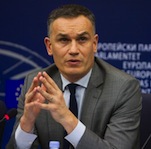
EU must adapt to new threats to its security
After years questioning if defence really mattered, Europeans are now experiencing a kind of a strategic awakening.
Defence and security issues have become an imperious reality and a top priority for European citizens, major capitals and European institutions.
This unprecedented “political momentum” should boost cooperation between Member States and help giving pace to new initiatives.
In an uncertain, destabilized environment and with more unpredictable actors, Europeans have now not only an opportunity but a duty to show that they finally intend to take greater responsibility for their own security.
The strategic environment in and around Europe has become more complex and threats have multiplied, from the conflicts in the southern flank (Libya, Syria, Sahel, Horn of Africa…) to the tensions at the Eastern borders (Georgia, Ukraine).
This boiling neighbourhood is spreading instability not only around Europe but also within Europe, with terrorism, espionage and cyber interference making Europe more vulnerable and endangering the very political resilience of European societies.
These challenges, common to all European countries and identified a long time ago, need collective answers.
However, neither those very concrete crises nor the rapid deterioration of European strategic environment has led to any direct or collective answer at the time when they happened.
What really triggered the strategic awakening for European defence and security were Brexit and the election of Donald Trump.
It is actually the concurrence of these two political events that have deeply affected European defence policy more than any serious consideration of strategic or purely security challenges.
European context seems, at least now, favourable for Europeans to be actors of their own security, and not rely systematically and exclusively on external alliances.
At a time when the multilateral international system is declining, when Europeans can no longer rely everywhere and forever with absolute certainty on their traditional partners, moving towards more strategic autonomy seems logical and necessary.
The implementation of this concept will enable European countries to tackle collectively and efficiently their common threats and assume better their security.
Therefore, they should be able to assess a crisis situation, decide and act as autonomously as possible.
It includes the possibility to say “no” to our American traditional ally, especially when it comes to Iran, or the Middle East or Asia.
It also means being able to act autonomously and to engage in the theatres of operations which are not considered as priorities by others.
This autonomy should be seen as a European ambition, part of the multilateralism framework, closely aligned with NATO and the US.
Nevertheless, moving towards more autonomy and more cooperation among European countries remains a complex process as it refers to the very heart of each country’s sovereignty, decision-making process, alliances, institutional system and military capabilities.
The first challenge for Europeans will be to converge strategic cultures that are still too heterogeneous.
Each country has its own institutional system leading to different rules of engagement and European countries do not have a common perception of the threats.
To me, there should be no fundamental contradiction in building an ambitious security policy against the immeasurable security challenges of the South, while unambiguously expressing total collective solidarity against threats to the East.
But still, trying to articulate, collectively, responses to both challenges without being detrimental to any of our vital interest remains a huge challenge.
Developing the industrial and technological base of European defence is key for more and better EU security, and the rare convergence between EU institutions and the main capitals offers now a unique window of opportunity for it.
Since the publication of the “EU Global Strategy” by F. Mogherini1, the EU has revived some defence policy tools aiming at encouraging cooperation in the industrial and capacity field.
By joining forces, by investing together, countries are cooperating in developing better capabilities to be less dependent on military supplies outside Europe and to have the capacity to intervene militarily in a credible way.
Among these initiatives, the famous PESCO finally launched should enable willing Member States to pursue greater cooperation in defence and security; the European defence funds should finance joint research and development; the military mobility should ensure road and rail networks suitable for military transport; and the new budget line for security and defence (27, 5 billions € and an increase in security by 40%) in the next MFF maintains the “political momentum”.
The conversion of a strong political will into ambitious initiatives is a first step.
However, being realistic, I am perfectly lucid about the colossal efforts that remain to be accomplished.
These positive initiatives still need to be implemented in concrete and flexible measures, and this is not the case yet.
In Brussels, divergence of views prevailed regarding the structure, the governance and even the relevance of these instruments.
Some countries want these tools to remain ambitious and operational. Some others fear that the EU defence funds would only benefit French and German companies and want to open it to third countries.
France wish these projects which are today mainly focused on industrial and capacity developments, to be more operational.
The euphoria that has accompanied the European awakening should be therefore taken with caution, pragmatism and lucidity.
Adapting to new threats for more and better European security is an ongoing and difficult process.
This will not be achieved by ambitious dec- larations, but by concrete steps, sometimes modest but that always requires pragmatism and political will.
We must hope to find a hard core of European countries convinced that it is possible to work together on the areas of capability and operation.
We must hope to have very soon a common European doctrine allowing to intervene militarily together, with appropriate budgetary instruments.
The European context is, at least today, favourable to creativity and political voluntarism.
These cycles are reversible and unfortunately never very long, so we must transform this dynamic.




